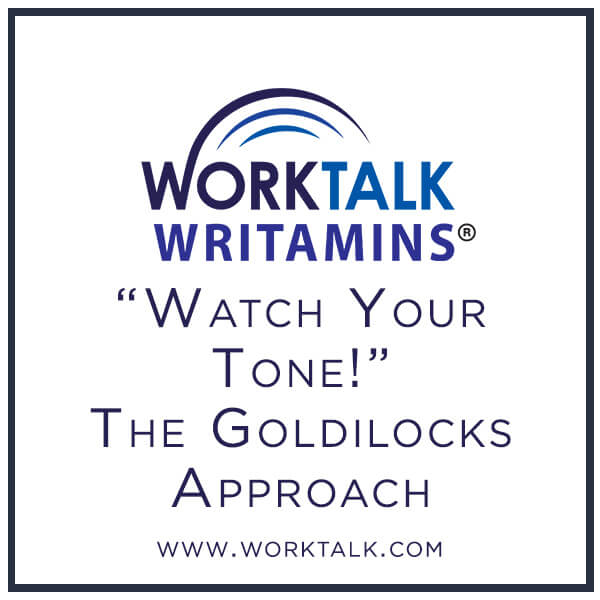
[5 minutes to read]
When I was growing up, my parents used to say, “Watch your tone!” whenever one of us was getting out of line. Why did they address our tone first? Because tone sets the feeling of any communication. It also determined who got sent to their room and who got to stay at the dinner table!
Our tone determines the success of our message. A harsh or cold tone makes the reader snap shut like an oyster that was stuck with a stick. A mushy tone reduces results. We’re looking for the Goldilocks tone: Not too formal, not too informal, not too cold, not too warm: Just right!
Let’s say Bob promised to send you some documents by the first of the month. It’s the 6th. No documents. You need to follow up. You could write with a variety of tones:
| Frigid | Hey, You promised those docs by the 1st. It’s the 6th. What’s the story? | This tone is likely to generate defensiveness and anger. Bob knows he’s wrong not to have sent the documents. Why rub it in? |
| Mushy | Dear Bob, If it wouldn’t be too much trouble, I would really appreciate receiving those promised documents by the end of the week, if possible.” | Mincing and fawning don’t work. By being overly passive, we are reducing the likelihood that we will get our desired results. |
| Goldilocks | Hi Bob, We had agreed that you would send the documents by the 1st. Could you please send or re-send them by Friday morning? | This tone reminds Bob of the agreement without putting him on the chopping block. It allows for the possibility that he sent them and you didn’t receive them. At the same time, it makes a clear request with a deadline. |
All Good Business Email Has Features in Common
An email requesting a refund for faulty equipment will not have the same tone as an email congratulating a colleague on a promotion. The complaint letter may contain fewer pleasantries, while the congratulatory email may contain an exclamation mark after a positive comment. Yet even these diverse messages have key features in common.
When writing for business, we aim for a tone is that is positive, respectful, and professional. We can complain without being nasty and congratulate without fawning. We can request without demanding and inform without condescending. To master this respectful tone, we need to know what to avoid and what to apply.
How Do We Achieve a Professional Tone?
Here are a few ways to write with a just right tone:
- Think about how your reader is likely to interpret your message.
- Our readers get to vote on our tone. We may think we’re just trying to get our day’s work done efficiently. Our readers may receive that hastily written email and think we are angry at them. Pause to visualize your reader before you hit Send: How is your message likely to be understood?
- Be polite.
- Mom was right. You cannot go wrong by using please and thank you. An occasional I appreciate your help is useful, too. Always use the magic words.
- Do not write in all caps, even when you’re trying to make an impact. Use bold, underline, and italics for emphasis.
- Avoid starting sentences with you unless you’re saying, “You did a great job.”
- Avoid emotionally charged words or negative slang. Email is forever and your words may come back to haunt you.
- Be conversational.
- Avoid stilted phrases and write like you speak, without becoming too casual. In exceptionally formal documents like emails to government regulators, be less conversational.
- When in doubt, get a second set of eyes to look at it.
- Other people can judge our tone better than we can do ourselves. If the email is important or you have any doubt, send it to a trusted friend or colleague for review.
Why Should We Worry About Tone?
Tone determines whether our readers will open their minds to our messages or curl up into defensive balls of resistance. As we plow through our inbox, it’s easy to get into a mindset of “Next! Next! Next!”, churning out email responses quickly.
To master our tone – and increase the chance that our reader will be open to our message – we need to slow down and imagine how our words will appear in our reader’s mind. Our goal is for the reader to find our tone just right.
For information on the Worktalk Email Effectiveness Workshop, contact lizd@worktalk.com.

©2019 Elizabeth Danziger All rights reserved
BOOK YOUR STRATEGY CALL NOW Communication woes drag down productivity and morale. Book your free 30-minute “communications audit” consultation with Elizabeth Danziger. She will listen to your situation and suggest ways to improve communication in your organization right away. Contact her at lizd@worktalk.com or 310.396.8303. You can also book through www.calendly.com/worktalk.
~~~~~~~~~~~~~~~~~~~~~~~~~~~~~~~~~~~~~~~~~~~~~~~~~~~~~~~~~~~~~
Gain clarity today. Contact Elizabeth Danziger at lizd@worktalk.com or Emma Fialkoff at upworktalk@gmail.com to learn how you can generate better business through better writing.
Read Writamins on these topics:
Emailing Effectively
Writing Well
Choosing the Right Word
Thoughts on Writing
Writing Within Organizations
